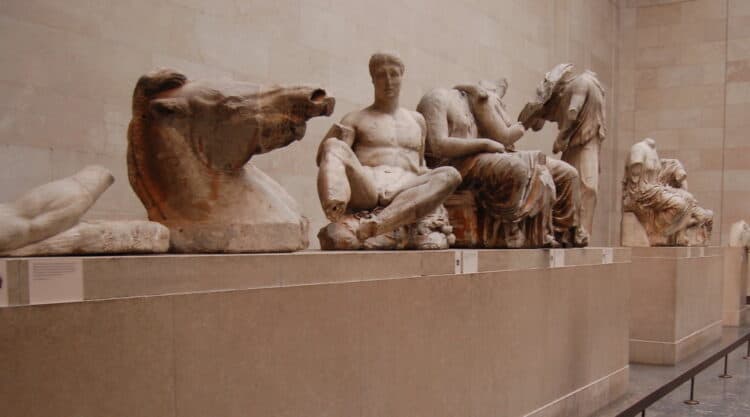The Elgin Marbles row is rolling on (pun intended).
Elgin Marbles
Rishi Sunak cancelled a meeting with the Greek PM in a row over the Elgin Marbles (the Parthenon Sculptures).
The PM was accused of throwing his toys out of the pram after Greek premier Kyriakos Mitsotakis told Laura Kuenssberg that the marbles should be returned.
He said having some of the artefacts in London and the rest in Athens was like cutting the Mona Lisa in half.
BBC’s Chris Mason wrote: “Rishi Sunak cancels meeting with the Greek PM in a row over the Elgin Marbles.”
As the row continues a sketch from comedy legend James Acaster has gone viral again.
You might like this post…
Conservative Home
Conservative Home waded in with their take on the issue, but actually used a picture of the Natural History Museum not the British Museum.
People were quick to react.
1.
2.
3.
4.
5.
Elgin Marbles History
The Elgin Marbles, also known as the Parthenon Marbles, are a collection of classical Greek marble sculptures that were part of the Parthenon and other buildings on the Acropolis of Athens. These sculptures date back to the 5th century BCE and are considered masterpieces of ancient Greek art. The Elgin Marbles derive their name from Thomas Bruce, 7th Earl of Elgin, a British ambassador to the Ottoman Empire in the early 19th century.
Between 1801 and 1805, Lord Elgin obtained a controversial permit from the Ottoman authorities, who then controlled Greece, to remove a significant portion of the sculptures from the Parthenon. Elgin claimed that he was preserving the artworks from further damage, but the circumstances of the acquisition have been a subject of debate and criticism.
The Elgin Marbles were later sold to the British government and have been housed in the British Museum in London since the early 19th century. Greece has long contended that the sculptures were unlawfully taken and has sought their return, arguing that they are an integral part of Greece’s cultural heritage.
The issue of the Elgin Marbles remains a source of ongoing debate and diplomatic tension between Greece and the United Kingdom. Supporters of repatriation argue that the sculptures belong in their original cultural context, while those in favor of their current location in the British Museum assert the importance of their accessibility to a global audience. The debate raises broader questions about the ownership and restitution of cultural artifacts with complex histories.
Related: Tory Mayor Candidate: ‘Pickpockting’ Story & Blaming Sadiq Khan For Rising Crime Is Questioned







